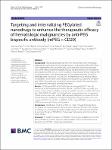Item Infomation
Full metadata record
| DC Field | Value | Language |
|---|---|---|
| dc.contributor.author | Chen, Huei-Jen | - |
| dc.contributor.author | Cheng, Yi-An | - |
| dc.contributor.author | Chen, Yu-Tung | - |
| dc.date.accessioned | 2023-10-09T03:11:33Z | - |
| dc.date.available | 2023-10-09T03:11:33Z | - |
| dc.date.issued | 2023 | - |
| dc.identifier.uri | https://link.springer.com/article/10.1186/s12645-023-00230-6 | - |
| dc.identifier.uri | https://dlib.phenikaa-uni.edu.vn/handle/PNK/9506 | - |
| dc.description | CC-BY | vi |
| dc.description.abstract | PEGylated nanoparticles (PEG-NPs) are not effective for hematologic malignancies as they lack the enhanced permeability and retention effect (EPR effect). Tumor-targeted PEG-NPs can systemically track lymphoma and actively internalize into cancer cells to enhance therapeutic efficacy. We generated an anti-PEG bispecific antibody (BsAb; mPEG × CD20) which was able to simultaneously bind to methoxy PEG on liposomes and CD20 to form multivalent αCD20-armed liposomes. This αCD20-armed liposome was able to crosslink CD20 on lymphoma cells to enhance cellular internalization and the anti-cancer efficacy of the liposomes to lymphoma. We generated mPEG × CD20 and used this bispecific antibody to modify PEGylated liposomal doxorubicin (PLD) through a one-step formulation. | vi |
| dc.language.iso | en | vi |
| dc.publisher | Springer | vi |
| dc.subject | EPR effect | vi |
| dc.subject | PEG-NPs | vi |
| dc.title | Targeting and internalizing PEGylated nanodrugs to enhance the therapeutic efficacy of hematologic malignancies by anti-PEG bispecific antibody (mPEG × CD20) | vi |
| dc.type | Book | vi |
| Appears in Collections | ||
| OER - Khoa học Vật liệu, Ứng dụng | ||
Files in This Item:

